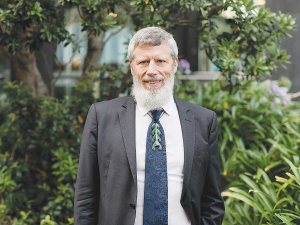Waikato dairy effluent breaches lead to $108,000 in fines
Two farmers and two farming companies were recently convicted and fined a total of $108,000 for environmental offending.
 Climate Change Commission chair Dr Rod Carr recently spoke to the Waikato Regional Council Climate Action Committee.
Climate Change Commission chair Dr Rod Carr recently spoke to the Waikato Regional Council Climate Action Committee.
Climate Commission chair Dr Rod Carr recently shared the commission's views - and some personal ones - with the Waikato Regional Council Climate Action Committee.
Climate Action Committee chair Jennifer Nickel says councillors welcomed the opportunity to pick Carr's brains to navigate the complex topic that is responding to climate change.
Councillors asked questions about agriculture, soil, riparian planting, forestry, shipping, aviation, energy, biosecurity, the role of local government and supporting capacity of iwi Māori, among other things.
"What really stood out for me was the reiteration of how there are so many positive opportunities for our communities to be had from a rapid transitioning to a low emissions economy, in particular around health and avoiding future costs," says Nickel.
"I'm really enthusiastic about future potential for ecosystems services payments for landowners who protect our natural habitats."
Carr attended the committee to share the commission's draft recommendations to the Government for the development of its second emissions reduction plan, and which the council will submit on.
The Government must deliver the second emissions reduction plan for New Zealand next year. The commission's advice focuses on identifying critical gaps in action, and where existing actions need to be urgently strengthened and accelerated to meet the second emissions budget (2026-2030) on New Zealand's path of net-zero greenhouse gas emissions and reductions in methane of 24-475 by 2050.
Nickel says councillors were particularly interested in the commission's views on agriculture, soils and forestry as they are identified in the council's Climate Action Roadmap as pathways to reduce emissions and adapt to climate change.
Agriculture is a key economic sector for the Waikato, yet it is also this region's greatest source of emissions. The next biggest sources are the transport and energy sectors.
Carr told the councillors it was important to get on board with new innovations to "reduce the emissions from agriculture".
"The world is already on that pathway through breeding, feeding and feed supplements," says Carr. "We're already seeing in Europe and parts of North American significant reducions and biogenic methane associated with protein production - and we need to get on board, or we will be left behind."
The councillors also heard from Carr about the commission's views on forestry, given the region's large exotic and native forestry contribution.
Greenlea Premier Meats managing director Anthony (Tony) Egan says receiving the officer of the New Zealand Order of Merit (ONZM) honour has been humbling.
Waikato dairy farmer Neil Bateup, made a companion of the New Zealand Order of Merit (CNZM) in the New Year 2026 Honours list, says he’s grateful for the award.
Another Australian state has given the green light to virtual fencing, opening another market for Kiwi company Halter.
Farmer interest continues to grow as a Massey University research project to determine the benefits or otherwise of the self-shedding Wiltshire sheep is underway. The project is five years in and has two more years to go. It was done mainly in the light of low wool prices and the cost of shearing. Peter Burke recently went along to the annual field day held Massey's Riverside farm in the Wairarapa.
Applications are now open for the 2026 NZI Rural Women Business Awards, set to be held at Parliament on 23 July.
Ravensdown has announced a collaboration with Kiwi icon, Footrot Flats in an effort to bring humour, heart, and connection to the forefront of the farming sector.